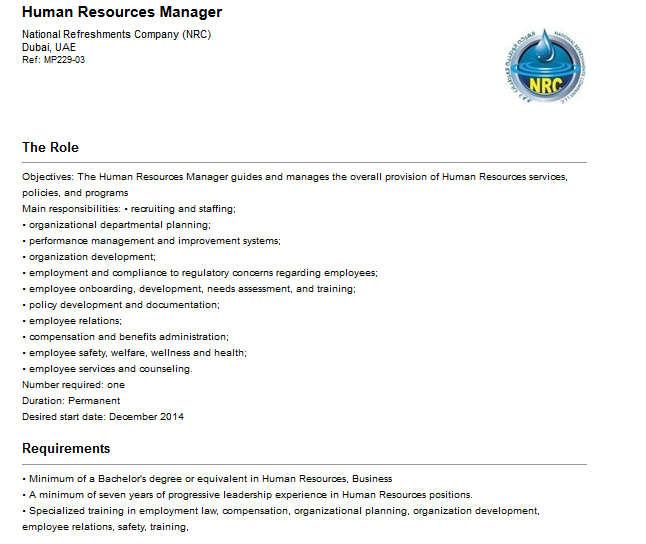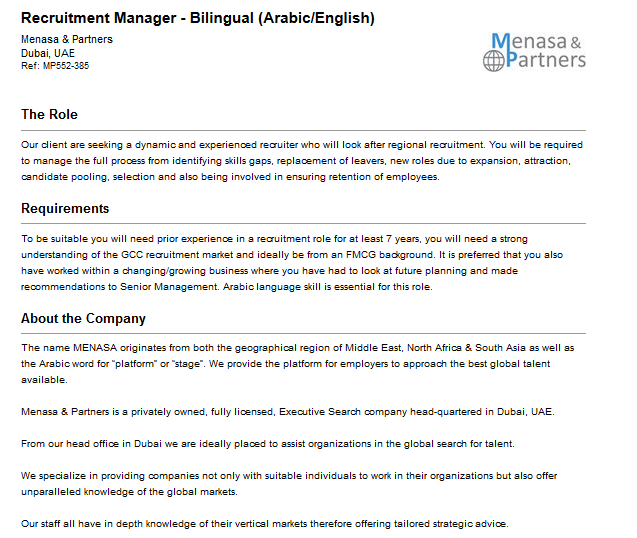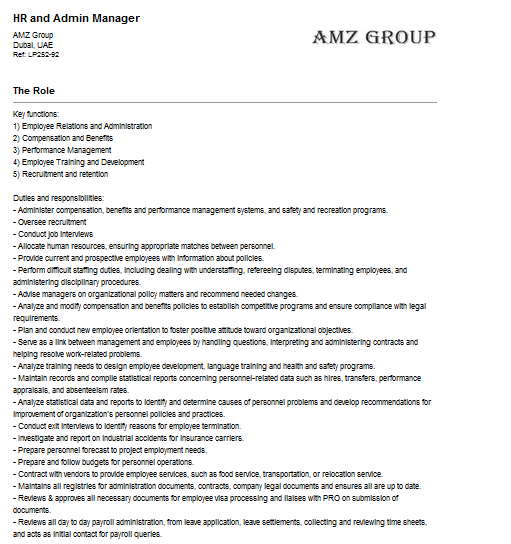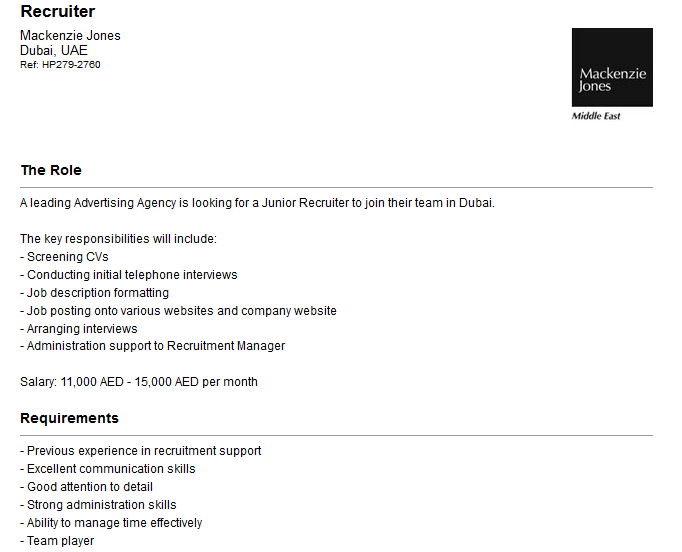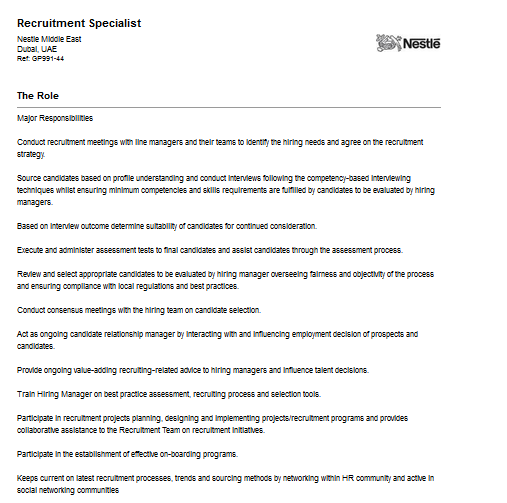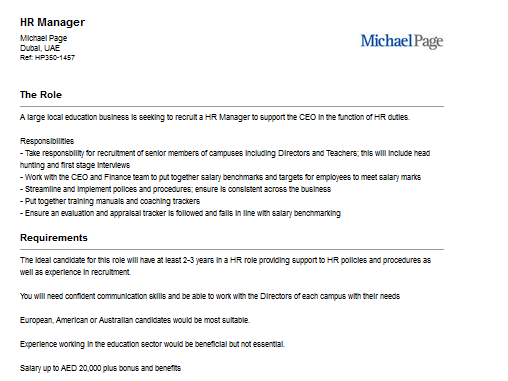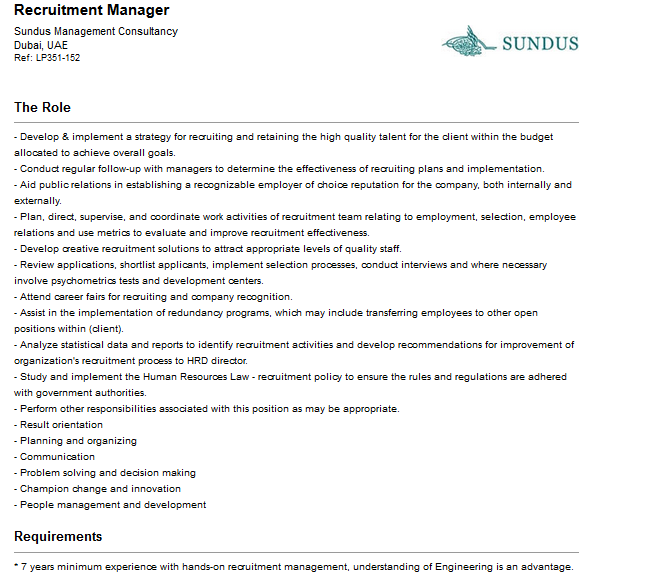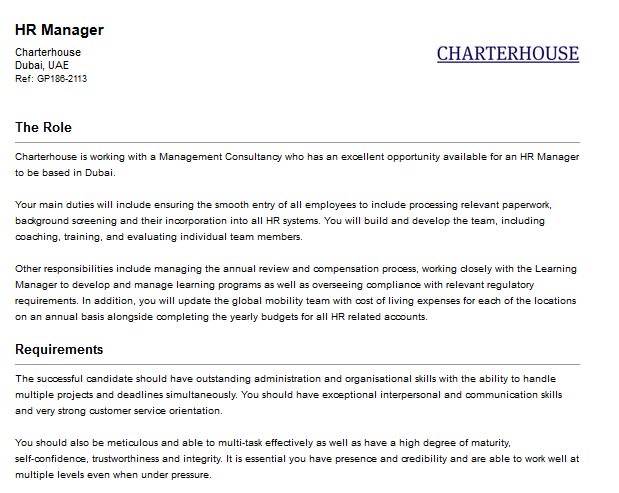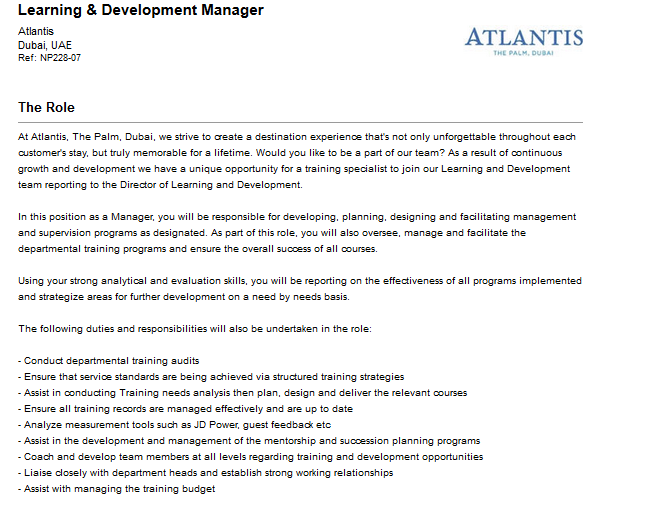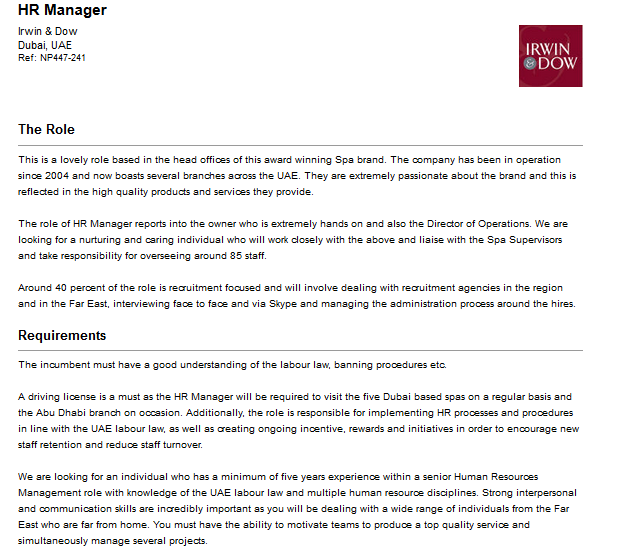Introduction
Strategic human resource management (SHRM) is an approach followed in learning organizations to create the effective base not only for implementing advanced human resource strategies but also for responding to the organizational changes. Following the principles of SHRM, leaders in organizations receive the opportunity to create the specific work environment guaranteeing the employees’ high performance and achievement of set strategic goals (Millmore 24).
SHRM is helpful to determine and achieve strategic goals, create flexibility in a firm, and encourage employees’ participation in decision-making process (Cascio 160). The purpose of this report is to explore how the principles of SHRM are followed in the UAE companies with the focus on analyzing requirements for HR vacancies with references to Ulrich’s model and to provide recommendations for improving the SHRM approach in the UAE.
Ulrich’s Model
Ulrich’s Model proposes the discussion of HR manager’s roles according to two axes, where the focus is on strategic and operational functions and on the process-related and people-related approaches. According to Ulrich’s Model, HR manager’s roles can be categorized following the dominant approach utilized by the manager or promoted in the organization (Ulrich and Brockbank 112).
As a result, there are four HR manager’s roles: Strategic Partner, Administrative Expert, Employee Champion, and Change Agent (Ulrich and Brockbank 112). Strategic Partner works to contribute to the corporate strategy while participating in developing and implementing strategies.
Administrative Expert performs traditional HR roles such as hiring and appraising employees. Employee Champion orients to coaching and training employees in order to satisfy their needs. Change Agent works to promote change and transformation in the organization (Ulrich and Brockbank 114). It is necessary to analyze HR vacancies in the UAE companies with references to Ulrich’s Model.
Findings and Analysis
Ten advertisements for HR vacancies in the UAE were analyzed according to Ulrich’s Model (Appendix 1). Requirements and descriptions of HR managers’ roles were examined, evaluated, and put in the four quadrants of Ulrich’s model (Table 1).
Table 1. HR Vacancies’ Requirements according to Ulrich’s Model
The identified requirements were analyzed and categorized according to the proposed four roles of Strategic Partner, Administrative Expert, Employee Champion, and Change Agent. After comparing the vacancies, it was found that the degree of requirements associated with strategic management and change management depended on the senior or junior HR position and on the company’s general strategic orientation.
Thus, recruiter in Mackenzie Jones is expected to perform as Administrative Expert and focus on traditional assistance and interviewing because the position is junior. The situation is different in relation to the Michael Page vacancy. HR manager is expected to perform all roles according to Ulrich’s Model, and the advertisement provides the clear distinction between roles.
The advertisement provided by Sundus Management Consultancy states that the company focuses on SHRM principles and needs mainly Strategic Partner and Change Agent. Although many companies expect managers to perform as Administrative Experts, such companies as Atlantis distinguish between the roles of HR manager and Development manager, while seeking for the strategic and development specialist. The focus on functions of Strategic Partner is typical for all vacancies.
The Analysis’s Implications
The results of the analysis are important for both potential candidates and organizations. Potential candidates should pay attention to the fact that such successful and large learning organizations as AMZ Group, Nestle Middle East, and Sundus Management Consultancy are seeking for candidates having the experience in the development and implementation of strategies as well as promoting change according to the principles of SHRM.
Candidates applying for senior positions should be able to adapt the HR strategies to contribute to the corporate main strategy and be oriented to future changes (Millmore 58). Furthermore, the analysis shows that organizations increase their requirements regarding applicants, and there is the high competitiveness in the market. Therefore, modern organizations also utilize head hunting strategies to recruit experienced HR managers.
Lessons for Applicants
Candidates applying for HR positions should clearly distinguish between junior and senior vacancies’ requirements and roles associated with positions of HR managers, Recruitment managers, Development managers, and recruiters. Companies seeking for recruiters expect that candidates will demonstrate experience as Administrative Experts and Employee Champions.
HR managers and Recruitment managers are expected to perform the variety of roles with the focus on strategic and change management. Development managers perform unique roles of Employee Champion and Strategic Partner.
Lessons for Organizations
Referring to the analysis, organizations can focus on the role of SHRM in modern companies. Requirements associated with the role of Strategic Partner support the idea that modern companies need supervision and recruitment strategies developed in line with the organization’s strategies in order to create the base for the further progress and change (Cascio 161).
Thus, the focus on the role of Change Agent is also important because HR managers are expected to recommend what change strategies are effective for employees of the concrete company.
Recommendations
- To address modern trends in the sphere, it is necessary to clear distinguish requirements associated with roles according to Ulrich’s Model.
- Organizations should clearly state what requirements are prioritized with the focus on the position or the company’s strategies.
- In the UAE, there is the high competitiveness in the market. Organizations should focus on distinguishing between process-related and people-related approaches and on strategic and operational functions important to achieve the company’s strategy.
- More focus on Strategic Partner and Change Agent roles is necessary.
Conclusion
SHRM is important for the company to meet the organization and employees’ changing needs and leaders’ expectations. While concentrating on SHRM, leaders receive the opportunity to plan and implement strategies with the focus on the optimal use of organizations’ human resources.
Thus, the UAE companies’ requirements to HR managers increased with the focus on SHRM aspects, and modern HR managers need not only manage skills and knowledge of human resources but also use their potential according to the organization’s strategic direction.
Works Cited
Cascio, William. “From Business Partner to Driving Business Success: The Next Step in the Evolution of HR Management”. Human Resource Management 2.1 (2005): 159-163. Print.
GulfTalent. 2014.
Millmore, Mike. Strategic Human Resource Management: Contemporary Issues. New York: Pearson Education, 2007. Print.
Ulrich, David, and Wayne Brockbank. The HR Value Proposition. Boston: Harvard Business Press, 2005. Print.
Appendix 1: HR Vacancies’ Advertisements
